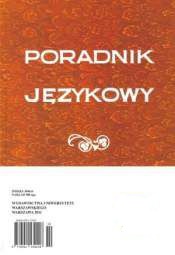Czasownik zażyć (się) w dziejach języka polskiego i bułgarskiego (analiza leksykografi czna)
The verb zażyć (się) in the history of Polish language and Bulgarian language (the lexicographic analysis)
Author(s): Yordanka Ilieva-CyganSubject(s): Language and Literature Studies
Published by: Dom Wydawniczy ELIPSA
Keywords: czasownik zażyć (się); etymon *-ŽIT’-; słowniki języka polskiego; słowniki języka bułgarskiego; czasownik ЗАЖИВЕЯ; USJP; SWil; SW; Sstp; SNG; SKCz; SEJPB; SEJP; ISJP; NSJB
Summary/Abstract: The author of the article tracks the semantic evolution of the verb zażyć (się), derivative from *-žit’- and derivated in the process of prefixation and confixation in the history of Polish and Bulgarian. The analysis was conducted on the material from Polish dictionaries containing vocabulary from the Old Polish times up to contemporary period and from Bulgarian dictionaries storing vocabulary from the end of the 19th to the beginning of the 21st century. Indo-European ground of the verb (*g’uei-) was specified and its Proto-Slavic form (*žiti, *živą). After the analysis it was possible to define the course of changes in the meaning of the verb zażyć in Polish as far more dynamic contrary to Bulgarian. However, in both Slavic languages one may notice specialisation of the motivated verb in a particular semantic sense of the verb base where newly accepted semantic range enlarges its content. Prefixal equivalence does not translate into semantic equivalence except in the meaning of ‛zagoić się’ (heal). In case of all Polish verbs derived from żyć (to live), including zażyć process of repartition of word-formation doublets is characteristic.
Journal: Poradnik Językowy
- Issue Year: 2010
- Issue No: 02
- Page Range: 58-69
- Page Count: 12
- Language: Polish
- Content File-PDF

